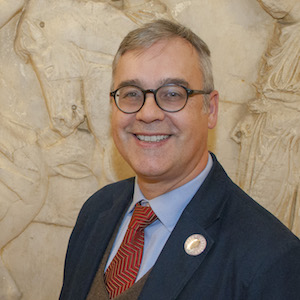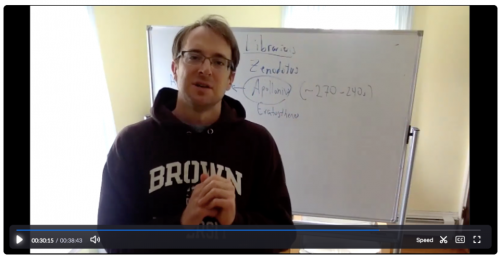
The COVID-19 virus has brought sadness and difficulty for many, and challenges for all of us.
The continued delivery of a Brown education has been central to the many ways in which the University has reacted. Many thanks to all the faculty and graduate students who have been delivering their courses in the new digital environment. We have learnt to deploy a new vocabulary (synchronous/asynchronous) and gained new friends (“Zoom buddies”). Supportive colleagues at Brown (special thanks to Christine Baumgarthuber, Giovanna Gastaldi, and everyone else in DLD) have made it possible for us to learn and implement the functionalities of Zoom and Canvas.
Our students have been working in new ways, not always under the most ideal conditions. Lack of access to the library on campus has been a major obstacle to progress in research, and learning in general. E-books and JSTOR are a great solace. So, too, our subject librarian, Bill Monroe, and the Library staff who have worked hard to respond to requests for help in providing resources.

Everyone has had to adapt. Lectures have been pre-recorded, classes delivered. White boards, both digital and traditional, have been used. Prof. Steve Kidd is seen here using the old-technology of the white board via Zoom in this screen shot from his computer as he delivers the post-450 BCE Greek Literature Survey course (GREK 1820).
Faculty have consulted with their students and come to agreements about how to deliver teaching; syllabi have been adjusted; “classroom” activity has adapted accordingly to the time zones of the students who have been taking part, from California to China, across the globe, and to different modes of interaction: chat, breakout rooms, Q&A sessions. For some students (well one in particular), ending a seminar at 1:00 am in the morning, their local time, has fulfilled a long-desired ideal schedule of nocturnal classes; while for others, 6:00 am starts have become a regular feature of their learning. Screen time brings difficulty: not everyone can tolerate prolonged screen time and for many (students, faculty, and administrators alike) there have been long days of multiple zoom engagements in the classroom and in meetings. Our Faculty DUS (Professor Pura Nieto-Hernández) and DGS (Professor Steve Kidd) have worked tirelessly to oversee the undergraduate and graduate programs and teaching.
So the adaptation to the remote/on-line campus has taken place. And perhaps for everyone it has made us realize how important the on-campus experience is for students and teachers alike. Although we will now be able to integrate digital technology with much greater confidence now!
Our senior students, the class of 2020, have today “completed” their classroom studies and they, above all, will have suffered the particular frustration that the disruption to the long-awaited end-of-year highlights of Commencement on campus brings. Although we can not provide you with the warmth of the reception that the Classics Department extends to our graduating students, and your friends and family, we look forward to doing so when we can have a face-to-face Commencement in the future.
Good luck to all students in the examination period and for what remains of the Spring semester. And thanks to all of you, students, faculty, and administrators, for making the teaching period in Spring 2020 possible.
Graham Oliver
Chair of Classics
Professor of Classics and History